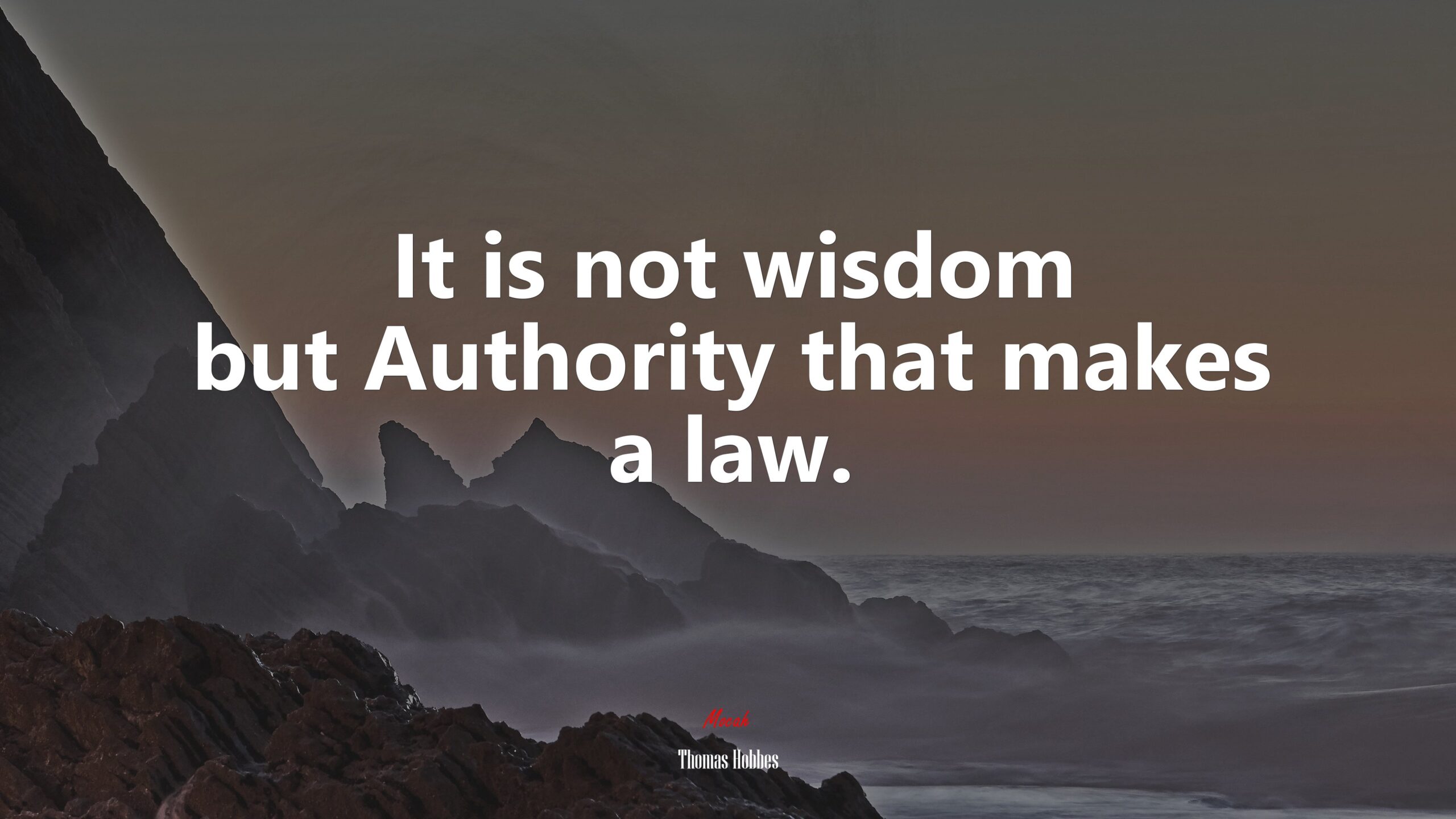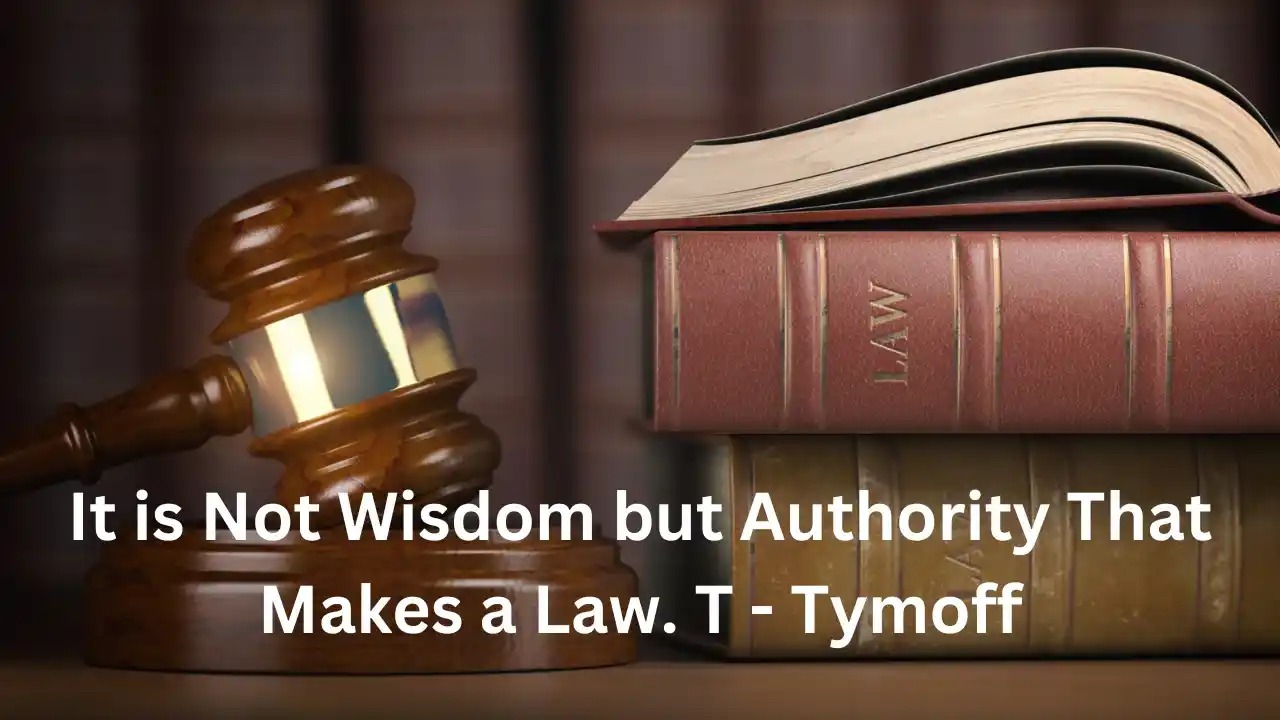It Is Not Wisdom But Authority That Makes A Law. t – Tymoff : In the realm of governance and legal systems, the concept of law plays a pivotal role in maintaining order and ensuring justice. However, the question arises: what determines the essence of a law? Is it the wisdom behind it or the authority that enforces it? This blog post delves into this thought-provoking topic, exploring the idea that it is not wisdom but authority that ultimately makes a law.
The Role of Wisdom in Law
The development of rules has traditionally been correlated with wisdom, which is frequently seen as the result of knowledge and experience. To create laws that regulated their communities, ancient cultures sought the advice of wise people. T. Tymoff’s assertion, however, calls into question the veracity of this notion.
The Role of Wisdom in Drafting Laws
One of the primary ways in which wisdom influences legislation is in the drafting of laws. Crafting effective legislation requires a deep understanding of the subject matter at hand, as well as the potential implications and unintended consequences of the proposed laws. Wisdom allows lawmakers to consider various perspectives, anticipate challenges, and strike a balance between competing interests. Without wisdom, legislation may be poorly crafted, leading to confusion, inefficiency, and even injustice.
The Importance of Wisdom in Decision-Making
Legislation often involves making difficult decisions that impact the lives of many individuals. Wisdom enables lawmakers to make informed choices that consider the long-term consequences and the greater good. By drawing on their knowledge and experience, wise legislators can navigate complex issues, weigh different options, and make decisions that align with the values and needs of their constituents. Without wisdom, legislation may be driven by short-term gains or personal interests, rather than the welfare of society as a whole.
Wisdom in the Interpretation and Application of Laws
Another critical aspect of legislation is the interpretation and application of laws. Laws are not always straightforward, and their implementation can vary depending on the context. Wisdom plays a vital role in interpreting laws in a manner that is fair and just, taking into account the intent behind the legislation and the evolving needs of society. Wise judges and legal professionals are able to navigate legal complexities, consider the spirit of the law, and apply it in a manner that upholds justice and equity.

Wisdom and Authority: Understanding the Relationship
Although wisdom and authority originally seem to be at odds with one another, when the law is examined, the complex link between them becomes clear. The ability to impose rules is what is meant by authority, as opposed to wisdom, which includes profound knowledge and discernment.
Together, they have a significant impact on both society and the individual through influencing the fundamentals of legal systems.
The Power of Authority
One cannot deny the significant influence that authority holds in the creation and enforcement of laws. Throughout history, rulers, governments, and legislative bodies have wielded authority to establish laws for the betterment of society. Whether it is a monarch, a democratically elected government, or an international organization, the power to make and enforce laws resides in those who hold authority. The authority’s ability to enact laws, regardless of their wisdom, can shape the course of a nation or an entire civilization.
The Limitations of Wisdom
While wisdom is undoubtedly valuable in various aspects of life, when it comes to the creation of laws, its role is limited. Wisdom, often subjective and influenced by personal beliefs and experiences, may differ from one individual to another. What one person perceives as wise, another may deem foolish. Laws based solely on wisdom, without the backing of authority, lack the necessary power to be effectively enforced and upheld. Wisdom alone cannot ensure compliance or provide the necessary framework for a functioning legal system.
The Balance Between Wisdom and Authority
Although authority plays a dominant role in lawmaking, it is not to say that wisdom should be completely disregarded. In an ideal scenario, wisdom should complement authority in the creation of laws. Wisdom can provide valuable insights, guiding authorities to make informed and just decisions. It serves as a moral compass, helping to ensure that laws are fair, equitable, and in line with the values and principles of society. However, wisdom alone cannot establish a law without the necessary authority to enforce it.
FAQ : It Is Not Wisdom But Authority That Makes A Law. t – Tymoff

1. Why does the proverb “It is not wisdom but authority that makes a law” mean?
This statement states that authority and power, not real wisdom or fairness, can be used to construct and enforce laws.
2. Do you have any examples of how authorities shaped legislation throughout history?
Throughout history, kings and monarchs have used their authority to create and uphold laws, occasionally without enough judgment.
3. How may the creation of laws be infused with wisdom?
Wisdom can be more successfully incorporated into legislative processes through procedures like public participation, openness, and accountability.
4. Why is it so important to keep the lines of authority and wisdom in check when passing laws?
By finding a balance between knowledge and authority, laws should not be entirely determined by those in positions of power. A just and equal society benefits from laws that are based on knowledge and authority.
Conclusion
It Is Not Wisdom But Authority That Makes A Law. t – Tymoff: while wisdom holds its own importance in various aspects of life, it is authority that ultimately makes a law. The power to create and enforce laws rests with those who possess authority, be it a governing body or an individual. However, this does not diminish the significance of wisdom entirely. A balance between wisdom and authority can lead to the creation of just and effective laws that benefit society as a whole. It is through this delicate equilibrium that the true essence of law can be achieved.

